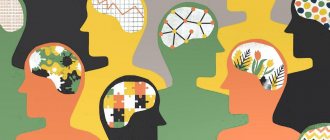From birth, a person finds himself in society - a certain circle of people with similar habits, standards of life, concepts, goals, etc. From an early age, he goes through different stages of socialization, which depend on his development, worldview, and attitude towards the environment. Sometimes it happens that a child or an adult misses some stage, so there are situations in which people can talk about a lack of upbringing or a closed character. Extroversion or introversion does not depend on knowledge of social norms and their application in life.
Socialization by definition is a long process consisting of several stages
Main age stages of socialization
Psychologists distinguish the following stages of personality socialization:
- primary socialization is the process of socialization that occurs from the birth of a person to the final formation of his personality;
- secondary socialization is the process of a formed personality entering society.
Primary socialization includes a person’s acquisition of social norms and rules in the early stages of life, from birth to adolescence; the secondary stage begins gradually with the expansion of the teenager’s social circle, the appearance in his life of more hobbies and groups formed in society under the influence of these hobbies.
The stages of personality socialization are clearly divided, but there is no hard boundary between them. It cannot be said that until the age of 14, for example, a person exclusively shapes himself, and after that he learns to fit himself into society. On the contrary, in essence, both stages are characteristic of us throughout our lives, it’s just that at an early stage of development, the child’s psychological characteristics are aimed at knowing himself, and later they are redirected outward, towards fitting himself into society, but even at retirement age one should not think as if the personality is completely formed and cannot be changed.
Features of socialization in childhood
It is in childhood, thanks to family influence, that the child develops those patterns that he considers generally accepted, and which he later guides during subsequent socialization.
At this stage, the child learns basic rules and norms exclusively from family members, since his inner world is extremely small and his environment is limited. And if a certain set of prejudices is accepted in the family, then the individual will enter the next stage of socialization with an opinion already formed in his head, taking into account the main family “party line”.
One of the problems of personal socialization associated with raising a child is the concept of the norm of family violence. If violence in a family is considered an indispensable attribute, if the father raises his hand against the mother, and the mother tolerates it and does not try to leave home, the child begins to perceive this situation as a given, and family violence as a variant of the norm for the entire society as a whole. And in the future he goes out into the world with the confidence that all his friends in the house have the same thing going on, they just, like him, are forbidden to talk about it.
Such a child may get a whole bunch of problems in the future when he is faced with the fact that for trying to raise his hand against a girl he will be scolded and ostracized in every possible way, and he will not be able to understand that the problem lies in his behavior, since for him personally this is an absolute norm.
Socialization of the school period
Socialization of the individual at the stage of school education gradually moves the child from the stage of primary socialization to secondary.
At school, an individual’s social circle expands sharply: after a couple of dozen people with whom he constantly communicates or occasionally meets in a kindergarten or clinic, the child finds himself in a big world full of classmates and children from parallel streams.
The attention of adults is not as carefully controlled as it was before, and the child gradually learns to establish relationships with other small individuals, acquires likes and dislikes, learns to behave in accordance with the new rules adopted in the group of students, gets used to the new environment and develops qualities that which in the future will help him establish contact with work colleagues and representatives of other social groups.
At this stage, the problems of socialization are those habits and typical reactions that are formed in him in response to the influence of others.
If a child was brought up in a family like a little prince, was surrounded by the love of his grandmothers and mother, if he grew up in the confidence that all his actions are correct and no one has the right to be dissatisfied with him, he will most likely not fit into the group of classmates, as a habit demanding obedience is unlikely to be appreciated by other children as a pleasant character trait.
Teenagers and self-discovery
Adolescence is a stage of development at which the child begins to spend more time with peers rather than with family members, and thereby makes his transition from the primary stage of socialization to the secondary stage - the formation of not only personality, but also the search for his place in the world .
At this stage, active group socialization of a person begins - he is looking for groups in which he could feel comfortable, be approved, significant, where he could share experiences and thoughts; Gender socialization enters the active phase - awareness of oneself as a representative of a certain gender and assessment of the social roles of representatives of one’s gender in society, acceptance or rejection of these roles in relation to oneself; the process of resocialization begins - a reassessment of previously mastered skills and values in view of gaining new experience and broadening one's horizons.
One of the common problems in the socialization of a teenager’s personality is the situation when he finds himself in an environment that accepts other, unusual standards of behavior as the norm and is left with a choice: to overestimate his own judgments or to defend his opinion and receive rejection from group members.
Types of socialization
Personal effectiveness - what is it?
The process of becoming a person in society has several categories:
- primary socialization;
- secondary;
- permanent.
Permanent socialization is a person’s ability to adapt to a new society
Primary socialization
Primary socialization of the individual begins from the moment of ontogenesis and ends approximately after puberty. This is the most basic stage of development. It is at this age that an individual is able to accept a huge amount of information, process it and make some acquired skills instinctive. That is, knowing from an early age that the act of polluting the environment does not correspond to the norms of behavior in society, a preschooler, after the end of the training period, will throw garbage into the trash bin on his own, without even thinking that it could be somehow different.
Secondary or re-socialization
Secondary socialization of the individual is the formation of new skills and knowledge of a person, while eliminating the previous ones. The individual tries to break the connection with the past, gaining another, no less valuable experience. This happens at the moment when a person feels the need to change his life attitudes. Resocialization lasts throughout life.
Permanent socialization
With knowledge of the basics of permanent socialization, a person can easily adapt to any society. There are very rarely cases when an individual does not use the skills of permanent socialization due to its uselessness. After all, throughout your life, your place of residence, city, country, place of work, and, accordingly, your social circle may change. It is this permanent process that will help a person quickly and easily adapt to new people, new rules, norms and laws.
Group socialization
The assimilation of norms accepted as fundamental in society, rules of behavior, restrictions and unacceptable actions is the process of education and instilling in a child a clear understanding of the boundaries within which he must move in order not to be rejected by others.
Our society is structured in such a way that an individual needs to receive social approval, belong to a group, and feel the support of members of this group. And for this we are forced to behave in a certain way, follow certain rules of behavior and fall into the pattern set by the group we want to join.
Patterns of behavior among groups can be different and even diametrically opposed: for some groups, community based on financial solvency is important, others, on the contrary, are formed by uniting poor members of society and declare themselves to be opposed to wealthy circles.
It is important to understand that it is impossible to socialize universally one hundred percent in such a way as to ideally fit into absolutely all segments of the population and groups, precisely because they value different qualities and opposing values. It’s not for nothing that people say: “You’re not a piece of gold to please everyone!” - you cannot please everyone, and in the process of socialization a person has to choose which group to join, and also oppose himself to some other group of people.
Stages of socialization according to A.V. Petrovsky
From the point of view of subject-object social relations, Petrovsky A.V. The following stages of socialization were distinguished:
- Adaptation. The adaptation period occurs during childhood. During this period, a person acts as an object of relationships, exposed to such agents of socialization as family, school, peers, etc. During this period, a person actively learns and forms his personality.
- Personalization. At this stage, a person acts as a subject of social relations. The leading activity is not the assimilation of social norms, but their reproduction, which allows a person to express his personality, individualize, and distinguish himself from other people.
- Integration. At this stage, a person acts both as an object and as a subject of social relations. This stage is characterized by the achievement of an optimal position of a person in society, allowing him to self-realize and exist harmoniously in society.
Consciousness of group selection
The choice of social group with which you interact is not always up to you. We make a conscious choice when we decide to take up a particular sport, enroll in a certain university, or move to another neighborhood. In this case, we can prepare ourselves for the norms that will most likely be characteristic of the environment in which we will find ourselves, since we will have time to study the issue, work on our reactions and socialization skills.
But sometimes, due to circumstances beyond our control, we find ourselves in an environment that cannot be called successful, and this is especially dangerous for not fully formed individuals - children and adolescents.
In the event of a forced move to a less favorable area, adult family members are able to distance themselves as much as possible from their neighbors and establish contact with them that does not include accepting their social standards of behavior. But a child or teenager, communicating with classmates and neighbors, does not yet know how to resist someone else’s authoritative opinion, and unconsciously absorbs and adopts those norms of behavior that he should not include in his picture of the world as correct.
This problem of personal socialization cannot always be solved by parents prohibiting the child from communicating with “bad” friends, but the environment in which your child grows up is a very important factor in growing up and shaping his personality.
Socialization and education
Education, in contrast to socialization, which takes place in conditions of spontaneous interaction between the individual and the environment, is considered as a consciously controlled process, for example, religious, family or school education.
Socialization of personality is a process in pedagogy that is studied inseparably from the process of education. The main task of education is the formation of a humanistic orientation in a growing individual, which means that in the motivational sphere of the individual, social motives and incentives for socially useful activities prevail over personal motives. In everything an individual thinks about, whatever he does, the motives for his actions must include an idea of another individual, of society.
Social groups have a great influence on the process of individual socialization. Their influence is different at different stages of human ontogenesis. In early childhood, significant influence comes from the family, in adolescence - from peers, in adulthood - from the work team. The degree of influence of each group depends on cohesion as well as organization.
Education, in contrast to general socialization, is a purposeful process of influencing the individual, which means that with the help of education it is possible to regulate the impact of society on the individual and create favorable conditions for the socialization of the individual.
Socialization of the individual is also an important topic in pedagogy, since socialization is inseparable from education. Education is understood as a social phenomenon that influences the individual through the tools of society. From this emerges a connection between upbringing and the social and political structure of society, which acts as the “customer” for the reproduction of a specific type of personality. Education is a specially organized activity in the implementation of the intended goals of education, in the pedagogical process, where the subjects (teacher and student) express active actions in achieving pedagogical goals.
The famous psychologist S. Rubinstein argued that an important goal of education is the formation of a person’s personal moral position, and not the external adaptation of the individual to social rules. Education must be considered as an organized process of social internalization of value orientations, that is, their transfer from the external to the internal plane.
The success of internalization is carried out with the participation of the emotional and intellectual spheres of the individual. This means that when organizing the educational process, the teacher needs to stimulate in his students their understanding of their behavior, external requirements, sensual living of their moral and civic position. Then education, as a process of internalization of value orientations, will be carried out in two ways:
- through the communication and interpretation of useful goals, moral rules, ideals and norms of behavior. This will save the student from a spontaneous search, in which it is possible to encounter errors. This method is based on the content-semantic processing of the motivational sphere and conscious volitional work in rethinking one’s own attitude to the real world;
- through the creation of certain psychological and pedagogical conditions that would actualize interests and natural situational impulses, thereby stimulating useful social activities.
Both ways are effective only with their systematic application, integration and complementarity.
The success of the education and socialization of young people is feasible provided that positive factors embedded in social relations, lifestyle, and the neutralization of factors that interfere with the implementation of the tasks of training, education and socialization are used.
The transformation of the education and upbringing system can only be successful when it really becomes a matter of society. It is worth reorienting social life, the cultural environment, and the system of education and upbringing towards the younger generation.
Gender socialization
The socialization of the individual cannot be fully accomplished without the individual mastering the cultural system of relationships between men and women characteristic of the society in which he lives, as well as awareness of gender roles and his place in this system.
Society begins to instill certain behavioral stereotypes in children literally from the cradle: in stores, for the most part, they offer a choice of only pink or blue baby care items, boys’ clothes are made mainly in blue, and girls’ in red, boys are given cars and pistols, and girls - dolls and decorations.
In the future, looking at the parents and guests of the family, the child absorbs those standards that pass before his eyes in the process of growing up: if the mother and her friends are mostly housewives and take care of cooking, cleaning and the house, and the father and his friends earn money and drive cars and play football, the individual will most likely internalize such a traditional value system, and in the future will begin to apply it to himself in accordance with his gender: a boy will strive to become a “breadwinner”, and a girl will be aimed at finding a husband who meets certain criteria, and dream of marriage and children.
If it is accepted in the family that mother works equally with father, and father cleans on weekends with mother, in the future the girl will not understand if her husband begins to demand that she sit at home and cook soups, and the boy does not appreciate his wife’s desire to become a housewife and study exclusively family matters.
Resocialization
The concept of personality resocialization is closely related to the stages of growing up. In essence, this term denotes the secondary socialization of the individual, which continues throughout life and includes a constant reassessment of previously accepted values.
Resocialization begins with the child going out into the outside world and observing people with different cultural, social and gender stereotypes. The more such observations a child accumulates, the more work happens in his head: he begins to understand that not all the words of mom and dad are axioms, that there are other points of view and a different view of the world. And under the influence of these factors in adolescence, the individual completes the formation of his personality, leaving some of the previous family attitudes, and replacing the remaining attitudes with others accepted from the outside and regarded by him as more suitable for him personally.
Over time, an individual’s social circle expands more and more, goes beyond the boundaries of school and university, and includes colleagues, friends in the gym, acquaintances from different segments of the population, therefore resocialization as an important element of personality formation is an endless process.
Legal socialization
Legal socialization of an individual is the development in a person of certain ideas about his place in society, as well as about his social role and the culture of society as a whole.
The main feature of the legal socialization of an individual is the process of assigning to a person certain typical (predictable) reactions, ways of perceiving information and forms of activity accepted in this particular society.
Having perceived the norms and rules accepted in the society around a person as the basic and only true ones, the individual subsequently reacts negatively to any deviations from this norm, often evaluates them as an attempt to violate public order as a whole, and even actively opposes those who exhibit unusual behavior for the given person. reaction society.
Legal socialization of an individual is a necessary and important process, at the same time closely connected with society’s attempts to discard any progressive ideas unusual for it, which seem to successfully socialized members of society to be a violation of the very foundations of the existence of a social group or the nation as a whole.
Legal socialization of the individual makes it possible to build a clear hierarchical structure of the group, within which subjects who most clearly adhere to the standards of behavior approved by society easily increase their status and are fixed on the upper tiers of the pyramid, and individuals with non-standard views on life are rejected.
Socialization what is
The child receives his first socialization skills in the family. If there are prosperous parents, the child has the opportunity to learn how to behave in society. The first society is parents. After 3 years, the child goes to kindergarten, where the study of the next stages continues in a larger society. In school classes and college groups, there is always an adult who is obliged to guide the child if something doesn’t work out for the latter.
Note! The basics of socialization are given to the child by the mother and father. This is the shortest stage of studying ethical standards. If any situation arises where an unreasoned point of view is imposed on a child, this is not teaching the stages of life and functioning in society, but the suppression of personality in a person.
Socialization is the process of learning and applying the rules and norms of the surrounding society. Thanks to this knowledge and skills, it is much easier for an individual to live and communicate with other people, and function in society. Formation must be correlated in three areas of life: activity, communication, self-development.
Desocialization
The concept of desocialization of the individual is closely related to resocialization, and means the destruction of previously mastered and accepted norms and rules of behavior, the destruction of previous attitudes. What is it and why is this process needed?
This process is used by psychologists when a person’s learned norms of behavior prevent him from successfully fitting into society. In this case, a person must desocialize - abandon previous attitudes, and then resocialize - accept new rules of behavior adopted in the group.
Desocialization is necessary for victims of domestic violence, people who went through wars and lived in combat zones, as well as those who moved to other countries with a different cultural heritage or when re-educating individuals suffering from deviant behavior - alcoholics, drug addicts, criminals. “Reconfiguration” of the head in such cases is necessary, and the process plan usually begins with an assessment of the attitudes that the individual sees as unshakable, and proof that this unshakability is apparent.
Deviant behavior
Deviant behavior is behavior that deviates from socially accepted norms, principles and standards.
Deviant behavior is not always a sign of something bad: for a patriarchal society, in which it is accepted, for example, that a woman does not have the right to vote, is obliged to hide her face, wear a skirt and remain silent, the behavior of an ordinary European woman will be regarded as extremely deviant, while in Europe they simply will not pay attention to it, since it fits into the standards of behavior accepted there.
The socialization of individuals can occur with disturbances, and then psychologists also talk about deviant behavior - it is because of improper socialization that people become criminals, they show a tendency to violence, cruelty, and illegal actions. Teenagers who are trying to stand out from the crowd and express their “I” also show signs of deviant behavior.
Deviant behavior is always the result of problems with the socialization of the individual, but, unfortunately, the socialization process cannot be written down as a plan and strictly followed.
When the process of personality socialization is completed
It is impossible to name a specific age at which a person would fully adapt to the world around him. This assessment is highly subjective. Some go through all stages of socialization quite quickly and painlessly, others cannot learn any norm over a long period of time.
From a subjective point of view, the socialization process can last throughout life. Some stages of formation end at a certain period of life, others begin. Recently, you can notice that the norms and laws of the public are constantly changing. At the same time, people are trying to adapt to new rules and meet social requirements.
Organizational socialization
Organizational or professional socialization is the process of an individual mastering the skills and attitudes adopted in an organization for the successful performance of basic functions, as well as for establishing relationships with colleagues.
At first, upon entering the workforce, newcomers become familiar with generally accepted standards of behavior in the organization, master the jargon, communication style, learn to comply with the dress code, and perceive the balance of power between people. This is also the socialization of the individual, and very important - often we have problems with work not because we are bad professionals, but only because even an excellent professional who is unable to establish relationships with people will bring nothing but harm to the organization.
To improve organizational socialization, it is customary for companies to organize various joint holidays, field trips, and conduct games and activities to improve communication between colleagues.
Personal socialization is a complex process that lasts a lifetime, associated with endless knowledge of the outside world and self-knowledge, developing the ability to establish relationships with other people in any social environment.
The ability to successfully fit into any system is useful to everyone, and one cannot think that socialization is important only for those who are not successful and do not fit into the framework. Since any framework has its values exclusively in a given period of time, and there is no guarantee that tomorrow the concept of the norm will not change, and that yesterday’s successful person will not find himself on the sidelines of life with his mossy concepts of the norm.
Socialization functions
Socialization plays an important role for both the individual and society. The main functions of socialization are the following:
- For the individual : a comprehensive, time-extended entry into the objective world - a separate part of society, a family or other community. Socialization makes it possible to understand oneself and interpret the behavior of other people, and interact with others.
- For society : socialization is one of the factors of normal reproduction of society. Despite the fact that people are constantly born and die, socialization makes it possible for society to reproduce itself and is a condition for the preservation and development of social culture.











